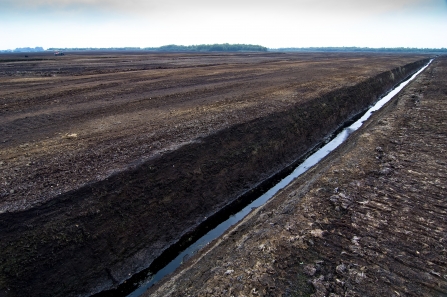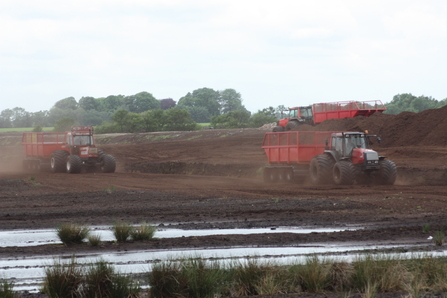-
Policy failure to stop peat extraction has caused up to 31 million tonnes of CO2 to be released since 1990
-
Peat extracted for horticulture in 2020 alone could release up to 880,000 tonnes of CO2 – equivalent in emissions to driving to the moon and back 4,600 times
-
Waiting another two years until 2024 to ban peat use could add more than 1.5 million tonnes of CO2 to our atmosphere – roughly equivalent to the annual greenhouse gas emissions of more than 214,000 UK residents
Devastating climate impact of using peat in UK horticulture revealed
The analysis estimates that as much as 31 million tonnes of CO2 could have been released into the atmosphere since 1990, as a direct result of using peat in gardening, and its use by professional growers of fruit, vegetables, and plants.
Save our peatlands (https://www.youtube.com/watch?v=Dd0cg4zhFv0&t=3s)
Standby Productions have produced an amazing film highlighting why we need to save our peatlands
Little Woolden Moss in Greater Manchester, was still being subject to peat extraction for horticulture until as recently as 2017. In some areas barely 50cm of the once almost 8m of peat was left, and the site had been totally stripped of all plant and animal life. The Wildlife Trust for Lancashire, Manchester and North Merseyside is working hard to breathe life back into this precious peatland, healing the scars that peat extraction left.
The campaign to stop peat extraction took off in the 1990s but only now are the UK and Welsh Governments conducting a public consultation on ending the use of peat in the retail sector in England and Wales by 2024. The Wildlife Trusts believe we cannot wait this long.
As well as analysing the impacts of peat extraction in the UK, The Wildlife Trusts found that the UK ‘offshores’ most of its peatland emissions and damage to wildlife to the countries who dig peat up to sell it in the UK. Currently, emissions from these imports are not counted in the UK's greenhouse gas emissions figures.
Despite thirty years of campaigning against extraction and increased public outcry, peat continues to be sold in vast quantities for amateur and professional horticultural use, with huge consequences for nature and climate.
Industry progress towards peat-free alternatives has been slow and inconsistent, and between 2018-19 peat consumption in the UK declined by just 2.3 per cent, before rapidly increasing by 9 per cent as lockdown drove more people to buy compost for gardening.
On average, annual UK peat sales would fill 29,000 large shipping containers and could release up to 850,000 tonnes of CO2
In 2020 alone, nearly 900,000 cubic metres of peat were extracted from UK soils, with a further 1.4 million cubic metres of peat imported from Ireland and the rest of Europe. A total of just over 2.29 million cubic metres of peat were dug up to be sold in the UK market in 2020, with a small quantity also being exported to other countries.

The devastation of peat extraction on Little Woolden Moss in Manchester
If peat is left undisturbed – in bogs, not bags – this quantity of peat could have stored approximately 238,000 tonnes of carbon for millennia to come. However, once peatland habitats are disturbed for extraction, stored carbon becomes carbon dioxide (CO2) and is lost to the atmosphere forever, contributing directly to climate change. The peat extracted for UK horticulture in 2020 could release up to 880,000 tonnes of CO2 over its lifetime as a growing medium. 880,000 tonnes of CO2 is equivalent to driving an average passenger car 2.2 billion miles – to the moon and back more than 4,600 times.
Ailis Watt, peat officer at The Wildlife Trusts, says:
“These losses are gigantic, irrecoverable and unjustifiable. Peat and the carbon stored within it simply cannot be replenished within human lifetimes. Each time governments dither over whether to ban peat use in horticulture, we risk losing more of this habitat that has taken millennia to develop, as well as losing its huge capacity for carbon storage.
“Extracting peat is bad for our climate and for wildlife. Peatlands provide habitat for a rich diversity of plants and animals. Migrating birds feed on peatland insects, while snakes and lizards also thrive in these special places. The UK is already one of the most nature-depleted countries in the world and extracting peat destroys complex ecosystems that are vital for nature’s recovery. It has to stop.
“Investing in peatland restoration whilst allowing extraction to continue is illogical and an inefficient use of public funds.”

Peat extraction on Little Woolden Moss in 2011
The Wildlife Trusts are calling for an immediate ban on the sale and extraction of peat for horticulture, and a ban on importing peat from abroad.
According to our recent analysis, waiting until 2024 to ban peat use could add more than 1.5 million tonnes of CO2 to our atmosphere (roughly equivalent to the annual greenhouse gas emissions of more than 214,000 UK residents) while further contributing to species and habitat decline. Bringing about an end to all uses of peat is an obvious step that UK Governments can take to put nature into recovery and transform peatlands from carbon emitters into carbon sinks.
The Wildlife Trusts are urging the public to respond to the Government consultation – it is open until 18th March 2022. The public are urged to take part in The Wildlife Trusts’ e-action here.
Further information and references
Defra’s consultation Ending the retail sale of peat in horticulture in England and Wales is here.
Analysis of the failure of voluntary measures to halt peat use in UK horticulture between 1990 and 2020. Nigel Doar, Head of Science & Research, The Wildlife Trusts. February 2022. Available here.
Statistics and references used in the press release:
- Up to 31 million tonnes of CO2 released by peat extraction since 1990 – see here.
- Emissions from peat equivalent to driving to the moon and back 4,600 times - based on total UK peat consumption (+ extraction for export) in 2020 of 2.29 million m3 and CO2 emissions of up to 385kg/m3 peat. GHG Equivalencies calculator (miles driven by an average passenger vehicle), and an average return distance to the moon of 477,710 miles (NASA).
- Waiting 2 years could release 1.5 million tonnes CO2 (roughly equivalent to that of more than 214,000 UK residents) – based on UK Government estimates of 7 tonnes CO2e per person per year.
- UK ‘offshores’ peatland emissions and damage to wildlife as majority of peat used is imported - see here.
- UK is one of the most nature-depleted countries in the world.
- Trends in UK peat consumption – see here.
- Average annual UK peat sales would fill 29,000 large shipping containers – based on average consumption from 2011-20, approximately 2.21 million m3 peat per year. A 40ft high cube shipping container is 76 m3 in volume.
- If peat is left undisturbed, 2.29 million m3 peat could have stored approximately 238,000 tonnes of carbon for millennia to come – based on 1 m3 peat containing up to 104kg carbon.
- Waiting until 2024 could add more than 1.5 million (1.68 million) tonnes CO2 – if average of peat usage from 2019-20 continues for a further 2 years.
- NB: the latest available data from Growing Media Monitor covers 2011-20. No data available in 2016 and 2017, so estimated figures are based on average of 2015 and 2018 usage.
Joint statement from environmental organisations released
A joint statement from organisations including The Wildlife Trusts, Greenpeace, Wildlife and Countryside Link, Plantlife, Buglife, Rewilding Britain, and supported by individuals including Alan Titchmarsh, Caroline Lucas MP, Megan McCubbin, Joe Lycett and many more, has been released:
Continuing to extract, import, export, and sell peat as a product is indefensible. We are pleased to see that the UK and Welsh Governments recognise the importance of keeping peat in the ground and are finally proposing a ban of peat in the retail sector. However, this is an urgent issue, and further delay until 2024 is unnecessary. UK Governments must act decisively and bring about a speedy end to the retail sale of peat for horticulture – there is no time to waste.
In going peat-free, the UK would benefit from securing a thriving, sustainable horticultural industry, that leads the way in the development of sustainable, peat-free growing media.
Peatlands are a rare type of wetland habitat that are home to fascinating plants and other wildlife, some of which can only be found in these precious environments. Peatlands cover just 3% of Earth’s land-surface but these extraordinary habitats hold twice as much carbon as all the world’s forests. Every year, millions of cubic metres of peat are dug out of the ground to be sold in UK markets for horticulture; these destructive actions fly in the face of the nature and climate goals of UK Governments. Protecting peatlands is a vital step we must take to put nature into recovery and to bring about an end to needless and vast carbon dioxide emissions. Healthy peatlands have the power to reduce the impacts of flooding, help to filter our drinking water, and are important conservators of our cultural heritage. Peatlands are vital habitats that urgently need our protection.
Full list of signatories can be found at https://peatfree.org.uk/
